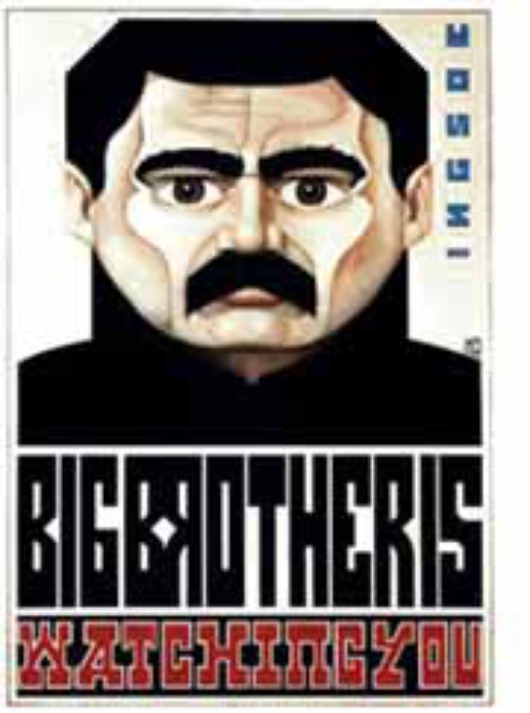Fighting Evil With Evil
Published on
Translation by:
 ruth ahmedzai
ruth ahmedzai
Terror - the word on the tip of everybody’s tongue - is spreading fear. In its shadow, ideas reminiscent of George Orwell’s 1984 are becoming commonplace, even acceptable, and threatening to push sober-minded prudence to the sidelines.
 In the novel 1984, the world is divided into three kingdoms embroiled in constant war against one another. This endless conflict is the justification for any manner of repression. Composure among the population is maintained by a carefully nurtured image of the enemy. Anyone who wishes to can also observe such trends reflected in the real world, where our enemy is international terrorism.
In the novel 1984, the world is divided into three kingdoms embroiled in constant war against one another. This endless conflict is the justification for any manner of repression. Composure among the population is maintained by a carefully nurtured image of the enemy. Anyone who wishes to can also observe such trends reflected in the real world, where our enemy is international terrorism.
The Ministry for Truth in Orwell’s novel flaunts these three slogans: “War is Peace”, “Ignorance is Strength”, and “Freedom is Slavery”.
War is Peace
Terror, and not one syllable here will refute this, is fundamentally condemnable. It is only the means for combating it that we should scrutinise. At the very moment when a state begins to retaliate violence with counter-violence, it condescends to the level of terrorism, at least as far as its methods are concerned. This is what Europe as part of the “coalition of the willing” has done in the Iraq war. It has achieved nothing through it, as the bombings in Madrid on March 11th vividly demonstrated. The general conclusion drawn from the attacks are: This is war. Who is the enemy? International terrorism. Where do we find it? Right here amidst us!
At the European Union spring summit in Brussels, European Commission President Romano Prodi said terrorism poses the greatest threat to the free world since World War II. That is why the EU Ministers of the Interior convened in Brussels on March 19th, a week after the Madrid attacks, to discuss Europe-wide anti-terrorism measures. They want to combat terrorism. And so we have a new image of the enemy to work with to make ourselves feel better.
The fact that this way of combating terrorism may contribute to a concentration of power that can lead to certain abuses is generally approved of. As long as we continue this war, we will have to accept this. Sadly, however, it is difficult to imagine that we could ever remove these measures, even in the distant future. Statewatch, a British organisation, said in this respect that of the 57 proposed anti-terrorism measures, the war on terrorism seems a meek excuse for 27 of them.
Ignorance is strength
The notion of “international terrorism” is on everyone’s minds and yet hardly anyone seems to know precisely what it is. In the end, it seems to not really matter exactly who or what is understood by it. What is important is that there is a danger out there that continues to grow, however widespread it gets. The advantage of such a vague threat is that the majestic right to define it is held by those who give the impression of being in the know, in this case governments. They rely on their secret services for an evaluation of the situation. The secret services in turn can possess a high degree of credibility, at least to begin with.
Governments and their secret services can create a backdrop against which restrictions on basic rights seem urgently necessary. We can hear talk now, for example, of huge volumes of personal data being stored with very little resistance from local populations. These proposals are also being neatly packaged up with other positive measures (such as setting up a European aid foundation for terrorism victims or introducing EU-wide arrest warrants) to ease their implementation. As far as the public is concerned, these procedures will eventually become little more than a sub-text in the margin. At the same time, everything possible will be done to avoid prompting a broad, public discussion about the real causes of international terror, because that would mean poking a finger into the wound of European development policy.
Freedom is slavery
Terror is a word of Latin origin meaning a sense of fear combined with horror, which terrorists take it upon themselves to disseminate. Sadly, they are far from alone in their shameful business: they receive active support from our governments. This view, as bold as it may sound, is easy to follow. It is only the fact that the problem is so frequently discussed and over-exaggerated that gives rise to a climate of fear, where freedom is perceived as something threatening. As violence of any kind is to be condemned, retaliation measures must be weighed with caution. In Europe, however, we seem already to be at risk of skimping on this caution. That is what we can see from the discussions of our Ministers of the Interior whose proposals would hurt our basic rights.
The victims of the anti-terror measures are our individual freedoms and dignity. These constraints bring with it their own kind of terror, albeit subtler, because at first it only affects marginal groups before eventually seeping into our everyday life. This might sound like a negative utopia but modern communication techniques and growing public surveillance with cameras have helped sacrifice a good part of our anonymity.
Reduced surveillance would, of course, bring dangers. Increased freedoms could effectively be used against us. Yet, if we were ready to tackle the root cause of terrorism then maybe we would no longer equate freedom as a threat to our security. We already have the concept of the Orwellian nightmare. Let's hope that it will never be synonymous with our daytime reality.
Translated from Den Teufel mit dem Beelzebub vertreiben


